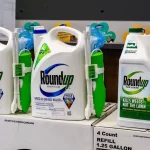Understanding the Health Dangers Associated with Monsanto Roundup® and Legal Recourse
History of Roundup® Use for Weed Control
Roundup® has been used for decades to kill unwanted plants and weeds in home gardens, garden centers, plant nurseries, parks, golf courses, and farms. Unfortunately, this glyphosate-based herbicide has also been the cause of severe health issues and cancer cases globally. In recent years, glyphosate has been categorized as a "probable human carcinogen" by the World Health Organization, the International Agency for Research on Cancer (IARC), and other health organizations. In addition, research has shown that the toxicity of glyphosate is amplified when combined with certain inert chemicals, as is the case with Roundup®.
In 1950, during his hunt for new pharmaceuticals, a Swiss chemist named Henri Martin synthesized glyphosate. Years later, Monsanto and John Franz (a Monsanto chemist) discovered the weed-killing capabilities of glyphosate and brought it to the market as the household name we all know—Roundup®. When Roundup® was rolled out by Monsanto in 1974, they promoted it as being a very safe and effective weed killer for commercial, agricultural, and consumer purposes. At one point, they even had an ad running that claimed Roundup® was "safer than table salt."
The demand for Monsanto's Roundup® exploded after its release, with farmers, landscapers, and consumers all praising its effectiveness. Today, 250 million pounds of glyphosate are used annually in the United States.
The Dangers of Glyphosate
The potential dangers of Monsanto Roundup® were not recognized until further studies were ordered by different regulatory agencies over a decade later. In 2015, the World Health Organization (WHO) officially labeled glyphosate (the main active ingredient in Roundup®) as a probable carcinogen, as did the International Agency for Research on Cancer (IARC). Studies since then have revealed that the toxicity of glyphosate is higher when combined with certain inert ingredients (i.e., surfactants). This dangerous combination is currently the recipe for Roundup®.
Bayer continues to deny the rising evidence pointing to the connection between the use of Roundup and the development of certain cancers. Past court cases have been setting the precedent that Bayer should be held accountable for not warning consumers of the dangers.
Why is Monsanto Roundup® Still Being Used?
Monsanto Roundup® is still the most popular herbicide in the world, generating billions of dollars in annual revenue for Monsanto. As of 2017, over 90% of domestic soy, cotton, and corn crops were genetically engineered to be glyphosate-resistant, thanks to Monsanto's patented "Roundup Ready" seeds that were designed to genetically withstand glyphosate.
Despite health concerns, Roundup® is still being used worldwide. Since the World Health Organization released its findings of glyphosate being a probable carcinogen in 2015, hundreds of individuals across the United States have stepped forward with cases claiming that Roundup caused them to develop cancers such as non-Hodgkin's lymphoma.
Who is at Risk of Roundup® Exposure?
Any individual who has regularly used Monsanto Roundup® for an extended period is at risk of developing cancer, including:
- Landscapers
- Farmworkers
- Orchardists
- Garden center workers
- Plant nursery workers
- Individuals who work in their gardens
- Golf course managers and groundskeepers
Glyphosate is dangerous upon inhalation, which can happen while mixing, spraying, and cleaning up. Mounting evidence points to the possibility that it may also be dangerous upon direct skin contact or when ingested via food consumption. Traces of glyphosate have been found in foods with treated soil.
Studies have shown that glyphosate exposure can increase an individual's risk of developing certain cancers by as much as 41%.
What Kind of Cancer Can Roundup® Cause?
Roundup® has been specifically linked to the following diseases, as reported by the IARC:
- Non-Hodgkin’s Lymphoma (NHL): Cancer that begins in white blood cells called lymphocytes and spreads to the lymph nodes, forming tumors in the body. This can affect lymph nodes, your spleen, and bone marrow.
- Waldenstrom Macroglobulinemia: A type of NHL that affects two types of B cells – lymphoplasmacytoid cells and plasma cells.
- Large Diffuse B-cell Lymphoma: The most common type of NHL that aggressively affects B-lymphocytes.
- Follicular Lymphoma: A type of NHL that transforms B-cells into malignant cells.
- Mantle Cell Lymphoma: A B-cell NHL that develops on the mantle zone of the lymph node.
- Cutaneous T-Cell Lymphoma: A rare type of NHL that begins in T-cells and attacks the skin.
- Chronic Lymphocytic Leukemia: A slow-progressing blood cancer that affects lymphocytes.
Recognizing Symptoms of Roundup® Exposure
If you are concerned that you may have caused your body harm from exposure to Monsanto Roundup®, keep an eye out for these symptoms and talk to a doctor if you experience them:
- Skin rashes (particularly where Roundup® touched your skin)
- Eye irritation
- Swollen lymph nodes
- Nausea
- Extreme fatigue
- Headaches
- Anemia
- Nosebleeds
- Loss of appetite
- Swelling of the abdomen or stomach
- Chest pain
- Sore throat
- Difficulty breathing
- Dizziness
- Lethargy
- Unexplained asthma
If you are using Monsanto Roundup® without proper PPE, you could accidentally inhale Roundup® and experience the following:
- Increased saliva production
- Irritation and burning in your mouth and throat
- Coughing
- Nausea and vomiting
- Diarrhea
Identifying Glyphosate Poisoning
The main active ingredient in Monsanto Roundup®, glyphosate, produces some distinct symptoms in individuals who have consumed large amounts of it. Go to urgent care or schedule an appointment with your medical provider if you experience a combination of any of the following symptoms:
- Dizziness
- Drowsiness
- Weakness
- Headache
- Diarrhea
- Anxiety
- Blue fingernails or lips
- Coma
- Low blood pressure
- Abdominal cramps
- Mouth and throat irritation
- Difficulty breathing
- Nausea and vomiting
In severe cases, other indications have included:
- Organ damage
- Gastrointestinal corrosion
- Kidney failure
- Pulmonary edema
- Respiratory distress
- Shock
- Significant irregular heart rhythm
- Cardiac arrhythmias
- Impaired consciousness
- Severe skin burns
- Corneal injury
- Metabolic acidosis
Confirming Roundup® Caused Non-Hodgkin Lymphoma
There is a diagnostic process that is used by doctors to confirm or rule out if you have non-Hodgkin Lymphoma as a result of your Roundup® exposure:
- Review Medical History: Doctors will review your medical history and your family's medical history.
- Physical Examination: They will physically examine you to check for a swollen liver, spleen, and lymph nodes in your neck, underarm, and groin.
- Blood and Urine Tests: They will conduct blood and urine tests to identify if there may be alternate causes for your symptoms.
- Imaging Tests: They may order X-rays, CT scans, or MRIs to look for tumors in your body.
- Lymph Node Biopsy: If you have swollen lymph nodes or tumors, they will remove part of or all of one of your lymph nodes or the tumor to analyze the tissue for non-Hodgkin lymphoma. They'll also identify the specific type if it is non-Hodgkin lymphoma.
- Bone Marrow Test: They will order a bone marrow test to remove a sample of your bone marrow and analyze it for lymphoma cells.
Legal Options for Roundup® Victims
If there is a connection between your health issues and Monsanto Roundup® exposure, you'll want to secure a lawyer right away to get your legal claim started. You could receive financial compensation for your illness resulting from Monsanto Roundup® exposure.
Filing a Roundup® Lawsuit
Since millions of people have used Monsanto Roundup®, it can be difficult to know if you have a case. If you have developed non-Hodgkin's Lymphoma or another illness after continued use of Roundup®, you may be entitled to compensation. We typically see cases come from home gardeners, agricultural workers, landscapers, garden centers, golf course managers and groundskeepers, and plant nurseries.
If you have reason to believe you were exposed to Monsanto Roundup® but haven't developed any symptoms, stay in communication with your medical provider. They can help you know what to keep an eye on, and in some cases, they can even enroll you in a monitoring program.
Roundup® Litigation and Jury Verdicts
The first Roundup® cancer trial took place in San Francisco, resulting in a substantial verdict against Monsanto. The jury awarded the plaintiff both compensatory and punitive damages, setting a precedent for future claims. Subsequent trials have continued to highlight the link between Roundup® and cancer, with juries holding Monsanto and Bayer accountable for failing to warn consumers about the health risks.
Regulatory Agencies and Safety Evaluations
The safety of glyphosate has been evaluated by various regulatory agencies, including the Environmental Protection Agency (EPA) and the European Food Safety Authority (EFSA). Despite some findings, there is still controversy over the carcinogenic risks of glyphosate. The International Agency for Research on Cancer (IARC) classified glyphosate as a probable human carcinogen, while other agencies have not confirmed this risk.
Legal Battles Surrounding Monsanto Roundup and Its Implications
Monsanto, the manufacturer of Roundup, has faced numerous legal challenges due to its widely used herbicide, which is regulated under the Federal Insecticide, Fungicide, and Rodenticide Act (FIFRA). While FIFRA governs the approval and labeling of products like Roundup, legal cases have centered around scientific evidence linking glyphosate, the active ingredient in Roundup, to cancer. The International Agency for Research on Cancer (IARC) has classified glyphosate as a probable human carcinogen, sparking significant litigation.
The Supreme Court and various courts of appeals have heard cases involving claims that Monsanto failed to warn users about the cancer risks. In one such case, a jury awarded millions in punitive damages to a plaintiff, underscoring the severity of the issue. Monsanto's defense often argues that its compliance with FIFRA should preempt state law claims, but plaintiffs continue to rely on scientific research to prove the dangers of glyphosate exposure.
The ongoing legal battles reflect a complex intersection of regulatory standards, insecticide, fungicide, and rodenticide laws, and emerging scientific findings. As more cases are litigated, the outcomes will shape the future of agricultural chemical regulation and corporate accountability.
Current Status of Roundup® Lawsuits
As of December 2023
Monsanto has reached settlement agreements in nearly 100,000 Roundup lawsuits, paying approximately $11 billion. Bayer has accomplished this by negotiating block settlement arrangements with plaintiffs’ lawyers who have significant cases in the litigation and by settling with plaintiffs before trial. Despite these settlements, Monsanto estimates that 54,000 active Roundup lawsuits remain, most of which have been filed in state court, with over 4,000 claims in the MDL Roundup class action lawsuit still pending in California.
Recent Trials and Verdicts
In recent months, there have been several significant developments in the Roundup litigation:
- November 20, 2023: A new $1.5 billion verdict was awarded.
- January 26, 2024: A $2.25 billion verdict in Philadelphia was announced.
- June 5, 2024: A Philadelphia Court of Common Pleas judge reduced the verdict in McKivision from January from $2.25 billion to $400 million.
- June 7, 2024: The MDL judge raised concerns about some plaintiffs' firms possibly taking on too many cases to settle them inexpensively.
Future Directions
Bayer continues to lobby for legislation to limit Roundup lawsuits, including provisions in the farm bill to reduce plaintiffs' ability to claim they were uninformed about the herbicide's health risks. Despite Bayer's efforts, new Roundup lawsuits continue to be filed regularly.
Impact of Litigation on Bayer
Bayer's ongoing wave of Roundup lawsuits over the widely used weedkiller Roundup is considered an "existential threat" to the company. Chief Executive Officer Bill Anderson emphasized the dire nature of the litigation threat, admitting that the glyphosate litigation threatens Bayer’s ability to continue surviving and innovating for farmers.
Conclusion
Monsanto Roundup® has been linked to serious health issues, including various forms of cancer. If you or a loved one has been exposed to Roundup® and developed non-Hodgkin's lymphoma or other health problems, it is crucial to seek legal representation. Experienced Roundup® lawyers can help you navigate the complex legal process and secure the compensation you deserve. Contact us today for a free case evaluation and let us help you fight for justice and fair compensation.
















